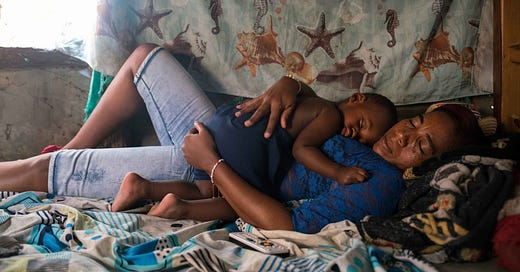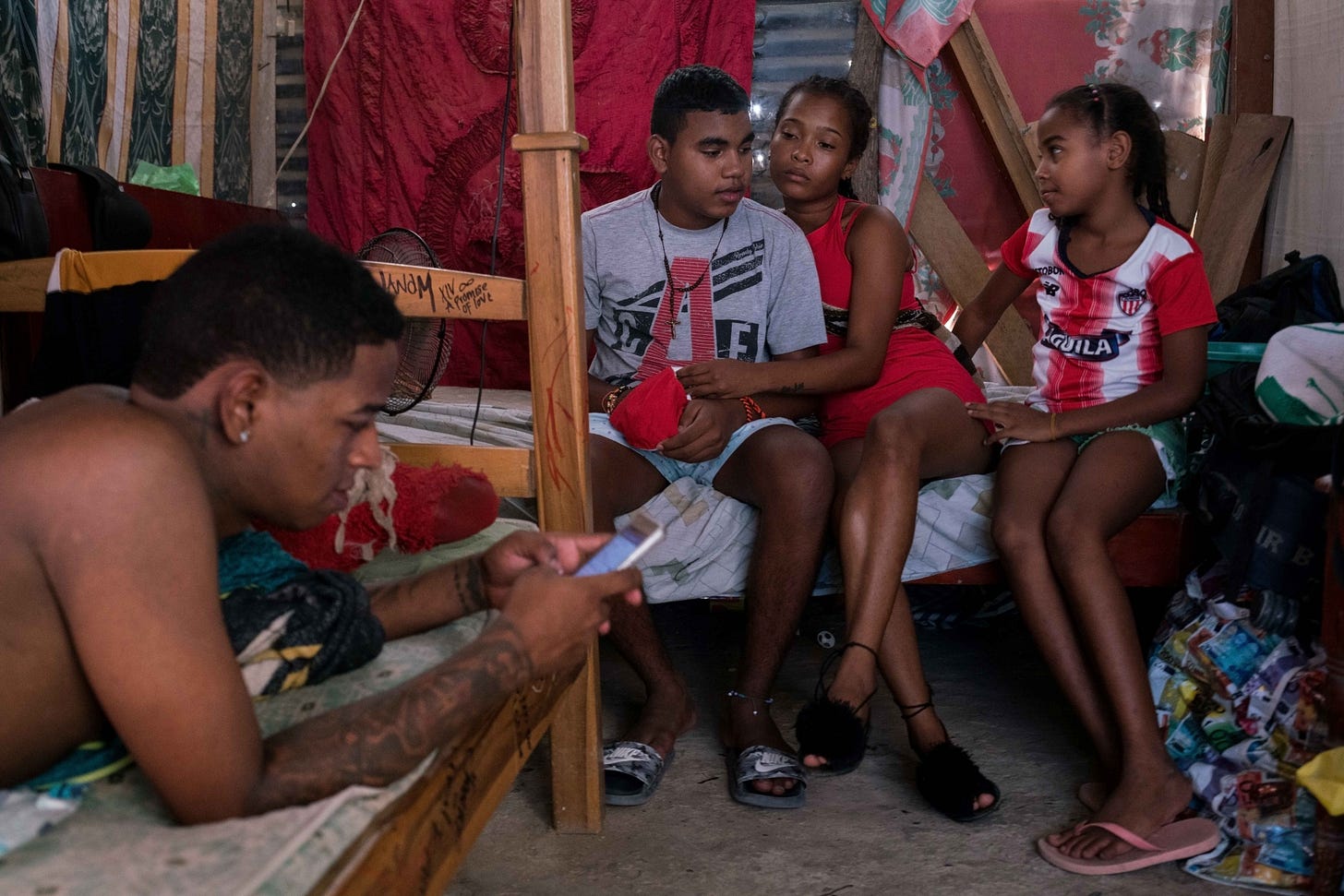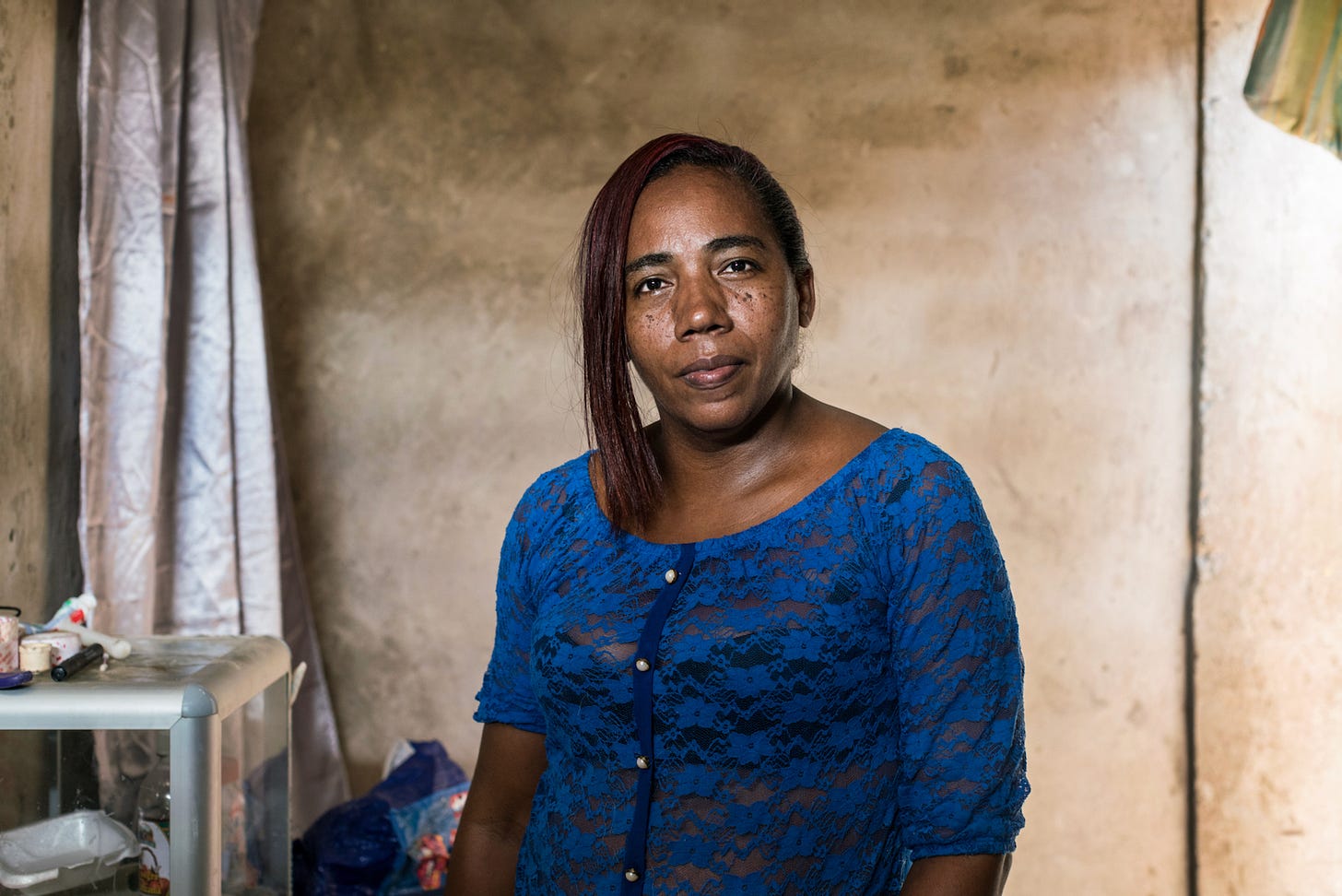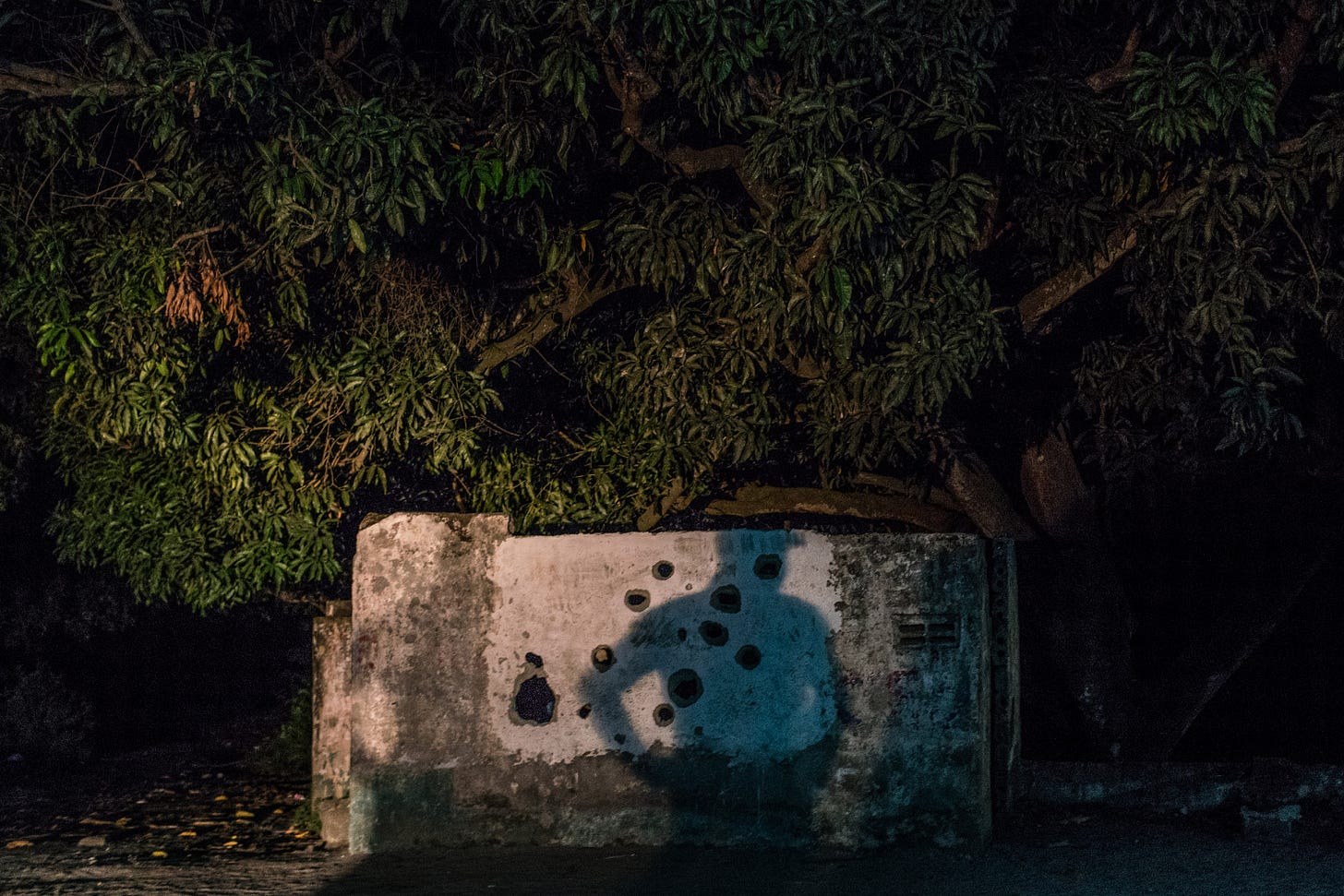The Stories You Never Forget
Silvana lived through the unimaginable. Now, she insists on being heard.
Silvana Hinestroza at home with her grandson. © Nichole Sobecki/VII.
I’ve spent the past several years working on a story about why rape survivors in conflict zones can’t get safe abortions, despite the fact that we know rape is endemic in conflict and that pregnancy often results from rape; despite the fact that rape survivors are legally entitled to abortions in most of the world; and despite the fact that it’s actually pretty easy to get safe abortions to women in need. The result was this piece in the New York Review of Books, and if you haven’t read it yet, I hope you will.
Years of reporting, though, means hearing a lot of stories that don’t make it into the final piece. I know there are some journalists who hear a story from a source and know, in the moment, that that particular person is going to be central to their final product; I often find that I have that experience — hear someone’s story and think, wow, this is it — only to sit down to write the piece and find that it doesn’t quite fit. Often the stories I find the most compelling or devastating or moving in the field aren’t the ones that I end up writing about, for a variety of reasons — sometimes they’re just too complex to distill down and still do them justice; sometimes the piece ends up being more policy-focused and I wind up using personal stories as illustrations rather than the core arc of the piece. Often, I’m surprised by what works when I’m writing and what gets left behind, and I always have to fight the impulse to force a particular person’s story into the piece because I found it so personally compelling.
That’s what happened here, with Silvana. I met Silvana in Riohacha, Colombia, on my last day in that town. I interviewed her at her home, in a hot, private room, with an incredible interpreter named Laura who remains the most skilled interpreter / fixer / story-telling partner I’ve worked with. Nichole Sobecki, my dear friend and the photographer I worked on this story with, waited outside so we could have some privacy.
The conversation with Silvana went on for hours. It was clear from the start that Silvana was a special person — charismatic, deeply intelligent, incredibly thoughtful, tremendously kind. She had gone through hell and when she came out the other side, she insisted on speaking, and on helping other women to speak, too.
Part of reporting stories about stigmatized topics like sexual violence and abortion, and using photos to illustrate them, is getting the subject’s informed consent — that is, not just saying, “can I use your full name and take photos,” but talking through how their words and images will be used, who will be able to see them (on the internet, everyone), and what to know about the potential benefits and repercussions. This is easier in a place like Riohacha where folks have televisions, newspapers, and internet access; it’s much harder in places where women have never seen a smartphone and the concept of “the internet” is fairly amorphous. And I’ve found it’s hard to predict what women will want. I’ve also often found that well-meaning NGO workers will insist on what they believe is best for women (often anonymity). But for women who have had their very basic right to control over their own body violently taken from them, it can be a powerful moment to have a conversation about what they want, where they are in control. When Nichole and I had that conversation with Silvana, she told us: Use my name and take my photo.
“My wish is to be in front of a camera and tell my story and see if any of them can at least tell me why — why all those things happened to me,” Silvana said. “There are so many things that I would like others to know. I hope a news channel or a TV show would say they want to interview me so I can speak clearly and all of Colombia will know the truth.”
I walked out of the interview with Silvana thinking, “this woman is central to my story.” And then it didn’t work out that way. But it doesn’t feel right to keep her story in my notes. So I’m sharing it with you now — what happened to Silvana, and how the invisible hand of the US government undermined her recovery.
Silvana’s children at home. © Nichole Sobecki/VII
In the north of Colombia and hugging its Caribbean coast is Riohacha, where Silvana Hinestroza, 43, lives in a small house with her boyfriend, her children, and some of her grandchildren. She grew up in El Bagre, a sleepy town in the same province as the drug cartel hotspot of Medellín, with three older sisters and a mother who sold lottery tickets. As a teenager, a volatile home life sent her to live with a nearby uncle. The civil war didn’t enter her consciousness until Silvana was 14 and walking the short distance home from a friend’s house after an evening spent working together on homework. Four men riding two to a motorbike pulled her off of the road and took her to a nearby house where they hit her below the chin with the butt of a gun. They were members of the Águilas Negras, a paramilitary group that is still active in the country four decades later. When Silvana came to, the men were gone, replaced by cleaning ladies. The women took Silvana to her uncle’s house, leaving her outside the front door, blood soaked between her legs.
“I went in, I had my keys, my bag,” Silvana says. “I walked in, I showered, everything burned. Everything hurt so much.” She didn’t totally comprehend what had happened, let alone have the vocabulary to explain it to her family. Even now, Silvana says, “I don’t like to hear when another person talks about ‘my first time, my boyfriend.’ I didn’t even have a boyfriend. I didn’t even know what a kiss was. I knew nothing.”
When the same four men came knocking at the door the next night, telling her they would kill her parents if she said anything, Silvana resolved to stay silent. Several months later, she realized she was pregnant.
At the time, abortion was illegal in Colombia, not that teenage Silvana would have known where to get one if it wasn’t. Instead, she bound her stomach with bandages and tried to starve the pregnancy away, only drinking water and juice for two weeks. “The day I ate solid food, I started hemorrhaging,” Silvana says. “It was a boy.” This was the first her parents had heard about the pregnancy. “They all asked me how if I didn’t have a boyfriend and I never left the house, I just did my homework,” Silvana says. “But I didn’t say anything. I said I couldn’t talk about it.”
As the years ticked by and paramilitary groups grew increasingly visible in El Bagre, Silvana was thinking it might be time to go. She had two daughters by the time she was 17 and little ability to support them after leaving their abusive father. One day, when she was working at a restaurant in a nearby town, two men came in and said they were looking for girls to work at a nearby billiards hall. The pay was great, and it was December – Christmas was coming, and Silvana thought about how happy she would be to give presents to her kids. Another young woman at the restaurant chimed in to say she was going, and encouraged Silvana to join her.
The supposedly near-by billiards hall was half a day’s drive over bad roads. Silvana was nervous, but the other woman, Morelia, seemed fine. But the next morning over breakfast, Silvana heard the rapid thud of military boots. Sixty-some armed men sporting red bandanas burst through the door, soldiers with the ELN, Colombia’s second-largest guerrilla group after the FARC. “I leave El Bagre running from the paramilitaries” Silvana thought, “and look where I end up.”
Morelia, it turned out, was the runaway wife of a man called El Tigre, a paramilitary commander from Barro Blanco. As the ELN men took her away to interrogate her, Morelia was hysterical, screaming at Silvana that they would kill her. With Morelia out of the room, the ELN guerrillas peppered Silvana with questions, seeming particularly interested in who she was married to. Silvana told them the truth – no one – but a while into the interrogation, they told her they knew: Silvana belonged to a man called Meo, who was like El Tigre a paramilitary member from Barro Blanco.
Silvana had never been to Barro Blanco, and certainly didn’t know of any Meo. Morelia, Silvana realized, had sold her out, accusing Silvana of being the runaway to save her own skin.
The women were held captive for the next month, until one of the guerrilla fighters took a liking to Morelia and the two ran away together, leaving Silvana behind. “That,” Silvana says, “is when my torture started.”
Silvana Hinestroza Mendoza, who has testified about her experience as one of thousands of young women who were raped or otherwise sexually abused by combatants in Colombia’s civil war, Riohacha, Colombia, September 26, 2018. © Nichole Sobecki/VII
The men locked Silvana in the pool hall, delivering the bare minimum of food. She heard them talking by radio: “Don’t let the chicken out, not even for water.” For days she wasn’t allowed to shower. Finally, the day before Christmas Eve, four of the men brought her behind the pool hall, where there was a small table and a bowl to wash with. It was time for her to bathe, they said. “There was one that grabbed me by the hair and threw me down on the ground, and he started abusing me,” Silvana says. “And then the next one, and the next one. Those four left and the other four came… And then the other four came. There were twelve men. It was about four, five, six hours, I don’t know how long. But to me they were such long hours. And they did everything to me. Everything, everything.”
On the 27th of December, the men took Silvana to their encampment, a two hour hike up a mountain, and presented her to their commander. He raped her in front of his men, and when she resisted, burned her private parts with a hot knife. Dozens of men went next, until Silvana was bleeding heavily. They brought her back down the mountain to the pool hall, and gave her some medicine – antibiotics, maybe, she’s not sure – and eventually the bleeding stopped, but it was replaced by a fetid discharge. Once the men saw that, they stuck her in a canoe, sent her down the river, and left her under a mango tree. Silvana, incredibly, managed to drag herself to a phone and call home.
“I would like to find Morelia one day, to know why she did this to me,” Silvana says. She knows the town Morelia lives in, and maybe someday she’ll go. “I would like to find her. For her to see everything that happened to me. Show her what my private parts look like now. Show her that because she ran away, I went through so much. I don’t even know if she’s alive. The guy she ran away with, he was taken back to the camp on the 17th of December and killed in front of everyone. Juan. But I don’t know what happened to her. I don’t know if she’s dead, I don’t know if she’s alive. All I know is it would be very easy to find her because she had a silver tooth. The kind that people used to get back then, that are in there for life. Her name is Morelia and she has a silver tooth.”
Silvana left El Bagre for good in 2007, after the paramilitaries threatened her family. She never told her parents or sisters about the rapes – she said she had been working, but was mugged on her way home and all her money was stolen. In 2011, she started working with an organization called Familias en Acción, helping displaced families secure compensation from the government. She was supposed to be getting payments for children, but wound up spending more time with the mothers. “The mothers started telling me, ‘Silvana, I need to speak to you,’” Silvana says. “And they started telling me, ‘Listen, I was abused.’”
She was shocked – she had thought she was one of the few. “When they started sharing with me, that was the greatest strength god could have given me,” Silvana says. “I work with both male and female victims of sexual violence. A hundred-something people. That’s when I started getting more involved. They hadn’t talked to the police yet, they were just like me, they were displaced from other places, they’d come here, but the fear, the shame, the embarrassment, it’s not easy. They were all keeping quiet.”
A car’s headlights project a man’s shadow across a roadblock riddled with bullet holes in Fundación, Colombia. © Nichole Sobecki/VII
The sessions were tough. “First, I’m crying with them,” Silvana says. “I feel sad, but I also give them the strength to move forward, telling them life goes on, that you can never forget these things, because it’s like a tattoo we carry. But I give myself the strength so I can then give them the strength.”
In 2016, the organization Profamilia — Colombia’s version of Planned Parenthood — reached out to Silvana. They were at work on a USAID-funded program focused on conflict-affected regions, and were providing contraceptive services and support for victims of sexual violence, of which there are many. Silvana was one of many Colombian women who had taken it up on herself to organize ad-hoc therapy groups, helping women to heal from what was perpetrated on them. Profamilia offered financial support, and trained counselors.
Then, Americans elected Donald Trump.
Trump’s Global Gag Rule, which he put into place just days into his presidency, cut off all USAID funding to Profamilia, along with hundreds of other organizations worldwide, because abortion is legal in Colombia and Profamilia offers abortions. Those abortions are never funded by US dollars, Gag Rule or not, but it doesn’t matter — Republican presidents punish groups that provide or refer for safe abortion care. These groups are, predictably, typically the ones offering family planning services, prenatal care, assistance to sexual violence survivors, and other aid to women and vulnerable communities. Without USAID funds, Profamilia had to shut down their program in Riohacha, and similar programs across the country.
Four years later, a Democratic president is in office, and the Gag Rule has been rescinded. But Profamilia’s money hasn’t been restored. It takes months or even years to assess changing needs, apply for new USAID grants, jump through the bureaucratic hoops of securing USAID funding, and then actually implement new programs. By the time all of the pieces are in place, American presidential elections threaten to undo any progress.
It doesn’t have to be this way: US foreign policy could consistently fund reproductive healthcare and other crucial health services — childhood immunizations, malaria treatment, HIV medications — without subjecting organizations abroad to America’s abortion wars. The Global HER act, sponsored by Rep. Barbara Lee, would take one important step in the direction of letting US foreign aid funding consistently pay for necessary services regardless of an organization’s internal position on abortion rights. It would not allow US funds to pay for abortions overseas, even for rape survivors — that would require overturning the Helms amendment, which I write about extensively in the New York Review piece —but it would mean that organizations, including those that don’t provide abortions at all, would be able to plan more than a year or two in advance, and would be able to offer more consistent and comprehensive services to people in need.
One of the things I love most about the work of journalism is that, even when reporting on some of the most depressing topics imaginable, you also get a front-row seat to how people are good. For every horrific story, there’s a helper. For every person who tries to shut women up and shut us down, there’s a Silvana, insisting on being heard.
Thanks for reading about her.
xx Jill
p.s. If you want to support feminist-minded journalism, analysis, and opinion writing, please consider upgrading to a paid subscription.







Not only is the Trump out of power, but Samantha Power is in charge of USAID.